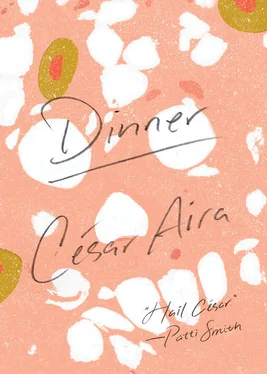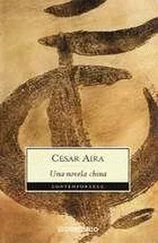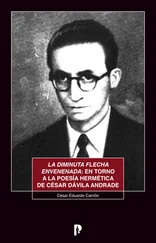She told me about one of the nightmares she’d had, or the only one, which she’d had repeatedly. She didn’t, at least, tell me any others. She said she’d had a dream about Crazy Allievi, that she was trying to cure him of his craziness and couldn’t… and she tried again, and still couldn’t… I don’t think she told me anything else, unless she did and I’ve forgotten, though actually I think I was the one who added something about a mountainous landscape, dusty and vast, under the perennial light of midday that shone on two lost explorers, or better yet, fugitives — running, tripping, on the verge of falling over a cliff: Mother and Crazy Allievi, dressed in old-fashioned black garments among those stones of despair, a hectic scene, but at the same time always at a standstill, like in comic strips.
In a way, my mother and I could read each other’s minds. So, if she didn’t recount any concrete images from her nightmare, and I saw them anyway, it didn’t mean that I’d invented them or that she hadn’t had them. In any case, they were momentary visions, like those that appear and disappear in the course of a conversation. Otherwise, I couldn’t have had a clear image of Crazy Allievi, because I’d never met him. How could I have met him when he was a character out of my mother’s childhood? I knew him from the stories I’d been hearing since I was a child. My mother’s best friend from childhood was a girl whom everybody called “Crazy Allievi.” They remained friends as they grew up. Crazy Allievi had a brother, who, logically, was also called Crazy Allievi. It was a kind of family problem. The difference is that Crazy Allievi, the sister, was called crazy for being wild, extravagant, “wacky,” as we often say casually. Her brother, on the other hand, was really crazy.
Of all the many stories my mother would tell about these siblings, I remember only two, one about the crazy sister and one about the crazy brother. The story about the crazy sister is the story of her dog. She had a dog, whom she adored, who was very important to her. She named it Rin Tin Tin, but she called him Reti, or, according to how Mother imitated her pronunciation: Rrreti . When I heard this as a child, it must have set me onto a certain train of thought, which was surely why it had stuck in my memory: you can name a dog whatever you want; it’s not that the dog “has” a name, that gets deformed or abbreviated by the family’s usage; nothing prevents this deformation or abbreviation from “being” the name. But Crazy Allievi would say (Mother always imitated her pronunciation): “My dog is named Rrrin Tin Tin , but I call him Rrreti .” This fact alone showed that she was crazy, though, I repeat, only sort of crazy, inoffensively and picturesquely crazy, nothing more.
My father, when he was alive, would often say that Mother specialized in crazies, that all her friends were crazy. And he was right, at least if you listened to her talk. Whenever she told anything about some friend or neighbor, it was to show how “crazy” she was. Her mealtime conversations would always start: “Today at Torres’ grocery store, I was chatting with X…” and we could already guess what would come next: “She’s crazy”; and throughout all the rest of the story, and in the stories that came after, she’d call her “Crazy X.” Her definition of “crazy” must have been much broader than the psychiatric one and included all those oddities that make people interesting, or interesting to her.
Returning to Crazy Allievi, the sister, and the only story I remember about her: when her dog died, she buried him and erected a gravestone with the inscription: “Here lies Reti” and the dates. That is, she definitely favored the nickname, not the name, and I suppose it was totally her right to do so, at least her right as a crazy person.
Remembering what had happened during the night, I thought that a name doesn’t only accompany us to the grave (Pringlesians often say, when they are trying to encourage someone to eat and drink heartily: “It’s the only thing you can take with you”; they’re wrong; you also take your name), but it also makes us return there in case of a breakout.
The story of her brother (that is, the anecdote about him that I remember) is more pathological: he drove his car all the way from their house in town to their farm, in reverse. The family had a farm, called La Cambacita, near Pringles, but not that near, about twenty-five or thirty miles away. And what with the bad dirt roads at the time, and in one of those black cars, driving that distance in reverse must have put Crazy Allievi’s driving skills to the test. But this was precisely what showed how deranged he was, because crazy people often have extreme capabilities, which can seem magical, in very specific skill sets. For starters, of course, his craziness was already expressed in the decision to drive in reverse. He did it only because the car was parked in front of the house facing the opposite direction from La Cambacita, and since he was going to La Cambacita, it must have seemed natural to him to go in that direction, instead of doing something as complicated as starting off in the wrong direction and only afterwards taking the correct one. Craziness is more of an exacerbation of logic than its negation. Moreover, if the transmission included a reverse gear, there must have been a reason for it.
It wasn’t due to a mere accident of memory that I associated Crazy Allievi, the brother, with this anecdote; Mother did, too, and to prove it, whenever she remembered him it was to remember that he drove to La Cambacita in reverse. And spending an entire life harboring that image necessarily had to engender vague suggestions of magical journeys, or magical landscapes traversed backwards, a journey around the world in reverse, or the expanding universe turned toward its infinite contraction. An inordinately large atlas belongs to this genre of magic, so inordinate as to threaten to equate itself with the territories it mapped.
The distress she had felt in the nightmare was the distress of the impossibility that accompanied the premise. Psychiatrists don’t cure crazies, especially not a crazy who’s been dead for sixty years. Moreover, my mother, in her (oneiric) role as psychiatrist, was diminished by the “broadened definition” of craziness I alluded to. Perhaps as a child she had learned what a crazy was like, thanks to her best friend’s brother, and since then she’d used the word as an adjective — for it could also be used as a noun — to describe everybody, until the word had lost substance and precision. By applying it to my friend, and by insisting on applying it to him in order to rescue me from the disgrace of being a failure, she was terrified to discover that it didn’t work. Garrisoned in his house, with his collection, his museum of toys, dolls, and masks, my friend resisted being defined as “crazy,” and she had had to turn back to the original crazy, who was still driving in reverse in his black car in her desolate little theater of memory.
Be that as it may, for the rest of the morning I had to listen to her repeat all her complaints. To escape such melancholy, I stared out the window, and that made it worse, because outside prevailed the excruciating monotony of a Sunday morning in Pringles — white and empty. I asked myself if in the long run my personality was working against me. I had always congratulated myself for being calm and polite, for my complacency, my tolerance, my almost invariable smile. I had not inherited my mother’s depressive and confrontational character but rather my father’s, which generally included an acceptance of the world that approached indifference, an aversion to arguments and conflicts, neither optimist nor pessimist, all against a backdrop of melancholy that he never took completely seriously. I had reasons to congratulate myself because if I’d had any other personality, I wouldn’t have survived the successive catastrophes that had sunk my life into nothingness. On the other hand, that personality excluded passions, outbursts, possessions, which would have given color to my existence and made it more interesting.
Читать дальше












